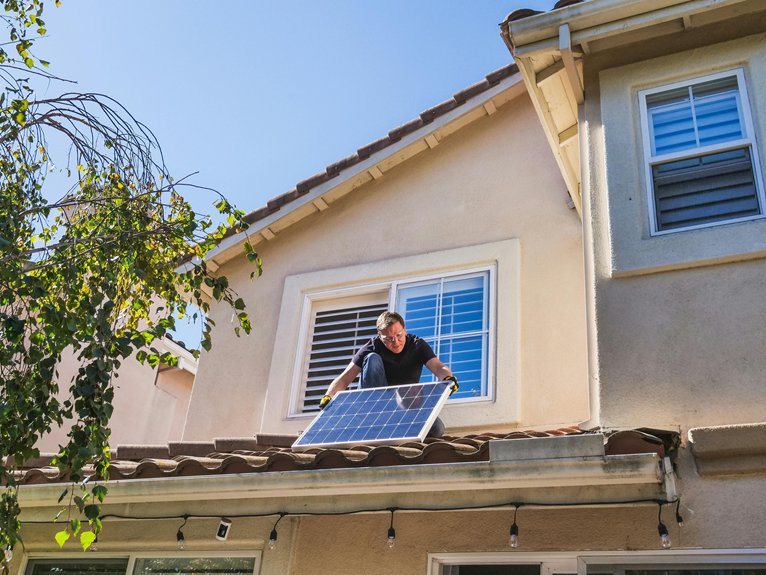Maintaining your commercial roof in Sanger requires regular inspections to catch issues early before they develop into costly repairs or structural problems. Weather fluctuations, debris buildup, and aging materials can all compromise roof integrity over time. By proactively scheduling routine assessments, you can identify hidden damage, ensure proper drainage, and extend your roof’s lifespan. Understanding the specific challenges your roof faces makes it easier to protect your investment and avoid unnecessary expenses—so, what should you look for?
Protecting Your Investment Through Preventative Maintenance
Regular preventative maintenance is essential for safeguarding your investment in a commercial roof. When you prioritize routine roof maintenance, you proactively address potential issues before they escalate into costly repairs.
Preventative care involves inspecting for damage, cleaning debris, and ensuring proper drainage, all of which extend your roof’s lifespan. By establishing a regular maintenance schedule, you reduce the risk of leaks, mold, and structural deterioration.
This proactive approach not only protects your building’s integrity but also minimizes downtime and unexpected expenses. Staying vigilant with preventative care demonstrates your commitment to maintaining a durable, reliable roof.
Engaging professional roofing services for inspections can further enhance your preventative maintenance efforts, ensuring thorough assessments and timely repairs. Ultimately, consistent roof maintenance helps preserve your property’s value and ensures your investment continues to perform efficiently over time.
Identifying Small Problems Before They Escalate
Catching small problems early can save you from costly repairs down the line. Regular inspections help you identify issues like drainage problems that cause water pooling or ponding, which can weaken your roof over time. Pay close attention to areas where water may not flow properly, and ensure drainage systems are clear and functioning.
Additionally, look for vent leaks around roof penetrations; even minor leaks can lead to water intrusion, mold, or structural damage if left unchecked. By proactively addressing these small issues, you prevent them from escalating into major repairs.
Consistent inspections allow you to spot these problems early, saving you money and extending your roof’s lifespan. Staying vigilant is key to maintaining a durable, leak-free roof in Sanger.
The Impact of Sanger’s Weather on Roof Integrity
Sanger’s weather patterns, characterized by hot summers, occasional heavy rainfall, and fluctuating temperatures, directly impact your roof’s integrity. The intense sun accelerates UV degradation, weakening roofing materials and making them more vulnerable to further damage.
Heavy rain and hailstorms pose immediate risks, with hail damage causing dents, punctures, or compromised protective layers. Temperature fluctuations cause expansion and contraction of roofing surfaces, leading to cracks and compromised seals.
Over time, these weather conditions expedite deterioration, increasing the likelihood of leaks and structural issues. Regular inspections help identify early signs of hail damage and UV-related wear, allowing you to address problems before they escalate.
Staying proactive ensures your roof maintains its protective function despite the challenging weather patterns in Sanger.
Common Commercial Roof Issues in Sanger
Water ponding is a common issue that can lead to roof leaks and structural damage if not addressed promptly.
Storms often leave behind visible signs like tears, punctures, or debris accumulation that compromise roof integrity.
Regular inspections help identify these problems early, preventing costly repairs down the line.
Water Ponding Risks
When roof drainage systems fail or are improperly designed, water can accumulate in low-lying areas, creating ponding issues that threaten the integrity of your commercial roof.
Persistent ponding can lead to drainage issues, causing water to sit and infiltrate seams or weak spots over time. Standing water also promotes algae growth, which can further degrade roofing materials and obscure inspection efforts.
Regular inspections help you identify early signs of ponding and drainage problems before they escalate. Addressing these issues promptly prevents costly repairs and roof leaks.
Ensuring proper slope, functional drains, and clear pathways for water flow minimizes ponding risks.
Staying vigilant about drainage performance safeguards your roof’s longevity and maintains the safety of your commercial property.
Storm Damage Signs
Storms can inflict significant damage on your commercial roof, often leaving behind visible and structural issues that require immediate attention. Look for signs of hail damage, such as dented or cracked roofing materials, and check for punctures or bruising that compromise the roof’s integrity.
Wind damage may appear as lifted or missing flashing, loosened seams, or torn membrane sections. Water infiltration around vents or along seams can also indicate storm-related harm.
Regular inspections help identify these issues early, preventing further deterioration. Pay close attention to the roof’s surface after storms, and don’t ignore minor dents or lifted materials, as they can lead to major leaks.
Proactive detection of storm damage signs ensures your roof remains secure and functional, saving you costly repairs down the line.
How Regular Inspections Extend Roof Lifespan
Regular inspections allow you to catch damage early before it worsens, saving you from costly repairs down the line.
By identifying issues promptly, you protect your roof’s structural integrity and extend its overall lifespan.
Staying proactive with inspections guarantees your investment remains secure and durable for years to come.
Detects Damage Early
Because early detection of damage is crucial, regular commercial roof inspections allow you to identify issues before they escalate into costly repairs. During inspections, you’ll notice accumulated roof debris that can trap moisture, leading to deterioration.
Insulation issues, such as moisture intrusion or compression, become apparent, helping you address problems before they compromise the roof’s integrity. Detecting minor damage like cracks, blisters, or punctures early prevents water infiltration and reduces the risk of more extensive damage.
Prevents Costly Repairs
Scheduling routine commercial roof inspections helps you catch small issues early, preventing them from developing into costly repairs. During inspections, attention to roof ventilation is vital, as poor airflow can cause heat buildup and moisture retention, accelerating deterioration.
Addressing ventilation problems promptly preserves roof integrity and reduces the risk of leaks. Additionally, inspecting gutter systems ensures proper gutter maintenance, preventing water backup and overflow that can damage the roof edges and underlying structures.
By proactively identifying clogged or damaged gutters, you avoid water pooling that accelerates roofing material breakdown. Regular inspections also allow you to implement timely repairs, extending your roof’s lifespan and saving money in the long run.
Staying ahead of potential issues keeps your roof in prime condition and minimizes the need for extensive, expensive repairs.
Maintains Structural Integrity
By conducting routine commercial roof inspections, you actively identify early signs of wear and structural weakening before they escalate into serious problems. This proactive approach helps preserve your roof material’s integrity and prevents costly damages.
During inspections, pay close attention to the condition of roofing materials, checking for cracks, blisters, or deterioration that could compromise the roof’s strength.
Additionally, inspecting ventilation systems ensures proper airflow, preventing moisture buildup that can weaken structural components over time. Maintaining these systems reduces the risk of mold, rot, and insulation issues, all of which threaten the roof’s longevity.
Regular inspections allow you to address minor issues promptly, extending the lifespan of your roof and maintaining its structural integrity for years to come.
Cost Savings Associated With Routine Roof Checks
Routine roof inspections can considerably reduce long-term maintenance costs by catching small issues before they escalate into costly repairs. Regular checks allow you to monitor the roof material’s condition and identify early signs of damage, such as loose shingles or membrane wear.
By maintaining an appropriate inspection frequency—typically biannual or after severe weather—you prevent minor problems from worsening. Proactive maintenance ensures that small leaks or deterioration don’t lead to structural damage or interior repairs.
Investing in routine inspections saves money over time by avoiding expensive repairs, extending your roof’s lifespan, and maintaining energy efficiency. Staying vigilant with scheduled inspections means you’re addressing issues promptly, ultimately reducing overall costs and preserving your commercial property’s value.
Choosing the Right Professional Inspection Services
Choosing the right professional inspection service can considerably impact the effectiveness and longevity of your roof maintenance efforts. Guarantee they understand the appropriate inspection frequency for your roof type and local climate, preventing minor issues from escalating.
Look for providers who adhere to strict certification standards, such as certifications from industry organizations like NRCA or OSHA, which demonstrate their expertise and commitment to quality.
Proactive professionals will tailor inspection schedules based on your roof’s age, material, and condition, helping you catch problems early.
Verify their experience with commercial roofs similar to yours and ask about their use of advanced diagnostic tools.
Selecting a knowledgeable, certified inspector ensures thorough evaluations, reliable recommendations, and a proactive approach that extends your roof’s lifespan.
Signs That Your Roof Needs Immediate Attention
Recognizing the urgent signs that your roof needs immediate attention can prevent costly water damage and structural issues. Look for shingle deterioration, such as curling, cracking, or missing shingles, which compromise your roof’s integrity and allow water infiltration.
Pay attention to granule loss in gutters, indicating aging shingles. Ventilation issues often cause moisture buildup, leading to mold growth and wood rot; signs include persistent humidity or musty odors inside your building.
Dark streaks or moss on the roof surface can also point to underlying problems. Additionally, if you notice leaks, water stains on ceilings, or sagging sections, these are clear indicators that your roof requires prompt inspection and repair.
Addressing these signs early sustains your property’s safety and longevity.
Incorporating Roof Inspections Into Your Property Management Plan
Integrating regular roof inspections into your property management plan is essential for maintaining the structural integrity and value of your building. To do this effectively, establish a clear inspection frequency based on your roofing materials—more durable materials like metal or tile may require less frequent checks, while membrane roofs need closer monitoring.
Schedule inspections at least biannually and after severe weather events to catch damage early. Incorporate these inspections into your routine maintenance budget to ensure timely repairs.
Proactive inspections help identify minor issues before they escalate, saving costs and extending your roof’s lifespan. By staying vigilant and consistent, you can protect your investment, maintain compliance, and avoid costly repairs down the line.
Conclusion
By scheduling regular commercial roof inspections in Sanger, you proactively protect your investment and catch issues early. Staying vigilant about maintenance helps prevent costly repairs, extends your roof’s lifespan, and maintains energy efficiency. Partner with experienced professionals to identify signs of damage promptly and address them before they worsen. Incorporating consistent inspections into your property management plan guarantees your roof remains resilient against Sanger’s weather and environmental challenges, safeguarding your assets for years to come. For more information on how to schedule your free roof inspection, call us at (405) 543-2920 or visit us online at Top View Roofing.


















